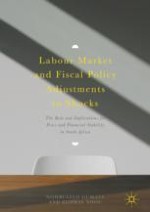2017 | OriginalPaper | Buchkapitel
40. Does Inflation Neutralise the Multiplier Effects of Expansionary Monetary and Fiscal Policy on GDP Growth?
verfasst von : Nombulelo Gumata, Eliphas Ndou
Erschienen in: Labour Market and Fiscal Policy Adjustments to Shocks
Aktivieren Sie unsere intelligente Suche, um passende Fachinhalte oder Patente zu finden.
Wählen Sie Textabschnitte aus um mit Künstlicher Intelligenz passenden Patente zu finden. powered by
Markieren Sie Textabschnitte, um KI-gestützt weitere passende Inhalte zu finden. powered by
Abstract
-
This chapter assesses whether inflation neutralises the multiplier effects of expansionary monetary and fiscal policies on GDP growth. Do the effects of expansionary monetary and fiscal policy multipliers on output differ above and below the 6 per cent inflation threshold? We establish that GDP growth rises significantly in the low-inflation regime as opposed to the high-inflation regime due to expansionary monetary and fiscal policy shocks. In addition, the proportion of fluctuations induced by these shocks is larger in the low-inflation regime than in the high-inflation regime. Therefore, inflation threshold matters and not all inflation levels are bad for economic growth. The counterfactual approach shows that actual GDP growth response to expansionary policy shocks rises more than the counterfactual response in the low inflation than in the high regime. This shows that high inflation lowers the policy multipliers effect. Furthermore, evidence shows that a positive inflation shock has a negative impact on the expansionary fiscal and monetary policy multiplier effects on economic growth. The decline is pronounced in the high inflation regime, hence the 6 per cent inflation threshold matters for inflationary impact on policy multipliers. Lastly, the chapter establishes that economic policy uncertainty has differential effects in low and high economic policy uncertainty regimes. Evidence shows that low inflation raises the expansionary monetary policy multiplier effects given a low policy uncertainty regime than that prevails in a high uncertainty regime.
